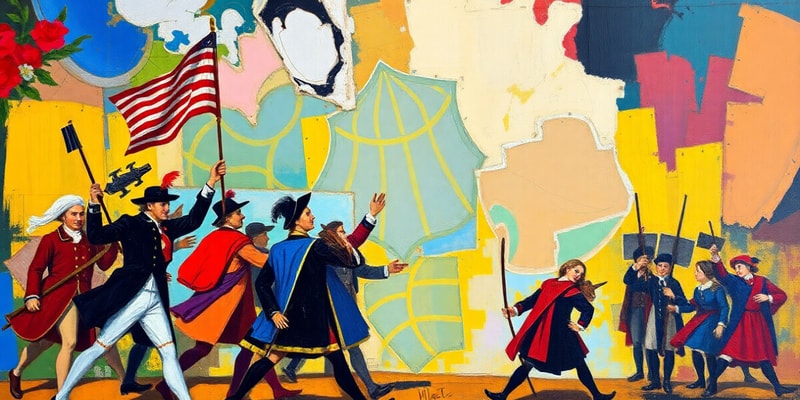Podcast
Questions and Answers
What was the significance of the Battle of Saratoga during the Revolutionary War?
What was the significance of the Battle of Saratoga during the Revolutionary War?
Which compromise established a bicameral legislature in the U.S. Constitution?
Which compromise established a bicameral legislature in the U.S. Constitution?
What major outcome resulted from the Anti-Federalists' concerns regarding the Constitution?
What major outcome resulted from the Anti-Federalists' concerns regarding the Constitution?
What was a key piece of advice in Washington's Farewell Address?
What was a key piece of advice in Washington's Farewell Address?
Signup and view all the answers
Which aspect did the Articles of Confederation struggle with significantly?
Which aspect did the Articles of Confederation struggle with significantly?
Signup and view all the answers
What did the Schenck v. United States case illustrate about free speech?
What did the Schenck v. United States case illustrate about free speech?
Signup and view all the answers
How did Franklin's testimony on the Stamp Act reflect colonial sentiment?
How did Franklin's testimony on the Stamp Act reflect colonial sentiment?
Signup and view all the answers
What was the purpose of the Constitutional Convention of 1787?
What was the purpose of the Constitutional Convention of 1787?
Signup and view all the answers
What was the Slave Trade Compromise in the U.S. Constitution?
What was the Slave Trade Compromise in the U.S. Constitution?
Signup and view all the answers
What was a direct consequence of the French and Indian War for the British government?
What was a direct consequence of the French and Indian War for the British government?
Signup and view all the answers
Which proclamation angered colonists by restricting their ability to settle west of the Appalachian Mountains?
Which proclamation angered colonists by restricting their ability to settle west of the Appalachian Mountains?
Signup and view all the answers
Which act imposed taxes on printed materials, leading to widespread protests from colonists?
Which act imposed taxes on printed materials, leading to widespread protests from colonists?
Signup and view all the answers
What fundamental idea did Enlightenment thinkers primarily advocate that influenced colonial leaders?
What fundamental idea did Enlightenment thinkers primarily advocate that influenced colonial leaders?
Signup and view all the answers
What was the purpose of the Boston Tea Party in 1773?
What was the purpose of the Boston Tea Party in 1773?
Signup and view all the answers
Which event marked the first collective action among the colonies in response to the Intolerable Acts?
Which event marked the first collective action among the colonies in response to the Intolerable Acts?
Signup and view all the answers
What role did the Second Continental Congress ultimately assume during the early stages of the Revolutionary War?
What role did the Second Continental Congress ultimately assume during the early stages of the Revolutionary War?
Signup and view all the answers
Which pamphlet argued for colonial independence from Britain and became influential in the revolutionary movement?
Which pamphlet argued for colonial independence from Britain and became influential in the revolutionary movement?
Signup and view all the answers
What was one of the primary grievances colonial leaders had regarding taxation from Britain?
What was one of the primary grievances colonial leaders had regarding taxation from Britain?
Signup and view all the answers
Which series of acts including the Tea Act heightened tensions leading to the American Revolution?
Which series of acts including the Tea Act heightened tensions leading to the American Revolution?
Signup and view all the answers
What major concern did Anti-Federalists have regarding the Constitution?
What major concern did Anti-Federalists have regarding the Constitution?
Signup and view all the answers
How did Washington's foreign policy perspective influence early American diplomacy?
How did Washington's foreign policy perspective influence early American diplomacy?
Signup and view all the answers
Why did colonists justify the use of force against British rule, as expressed in the Declaration of Taking Up Arms?
Why did colonists justify the use of force against British rule, as expressed in the Declaration of Taking Up Arms?
Signup and view all the answers
What made the Stamp Act particularly offensive to the colonies, according to Franklin’s testimony?
What made the Stamp Act particularly offensive to the colonies, according to Franklin’s testimony?
Signup and view all the answers
How did the Treaty of San Lorenzo contribute to the security of the U.S. western frontier?
How did the Treaty of San Lorenzo contribute to the security of the U.S. western frontier?
Signup and view all the answers
What concern did elite Pennsylvanians have about popular democracy, as highlighted by Terry Bouton?
What concern did elite Pennsylvanians have about popular democracy, as highlighted by Terry Bouton?
Signup and view all the answers
What was a consequence of the elite's resistance to democratic power in the structure of the new government?
What was a consequence of the elite's resistance to democratic power in the structure of the new government?
Signup and view all the answers
What was an early diplomatic effort by the U.S. to secure its borders, exemplified by the Treaty with Spain?
What was an early diplomatic effort by the U.S. to secure its borders, exemplified by the Treaty with Spain?
Signup and view all the answers
What was a significant impact of Washington's Farewell Address on U.S. foreign policy for decades?
What was a significant impact of Washington's Farewell Address on U.S. foreign policy for decades?
Signup and view all the answers
How did concerns of the elite influence the creation of the federal government?
How did concerns of the elite influence the creation of the federal government?
Signup and view all the answers
Study Notes
Colonial Conflicts and Tensions with Britain
- French and Indian War (Seven Years’ War): A clash between Britain and France over territory in North America. Britain's victory led to vast territorial gains but also immense debt, prompting the imposition of taxes on colonies.
- Proclamation of 1763: A British decree prohibiting colonial settlement westward of the Appalachian Mountains, aimed at stabilizing relations with Native Americans. The proclamation angered colonists seeking expansion.
- Taxation without Representation: British efforts to impose taxes through acts like the Sugar Act, Stamp Act, and Townshend Acts, which lacked colonial representation in Parliament, sparked protests.
Intellectual Influences and Revolutionary Ideals
- Enlightenment Ideals: Philosophers like John Locke emphasized natural rights and the social contract, influencing American ideals of individual liberty and consent of the governed.
- Thomas Paine's Common Sense (1776): A pamphlet arguing for colonial independence from oppressive British rule based on principles of common sense and self-governance.
The Road to Revolution
- Boston Tea Party (1773): A protest against the Tea Act that saw colonists dumping British tea into Boston Harbor, intensifying colonial resistance.
- First Continental Congress (1774): Meeting of colonial representatives to address grievances against British policies, leading to boycotts and preparation for potential conflict.
- Second Continental Congress (1775): Assumed the role of a wartime government amidst escalating conflict, eventually leading to the Declaration of Independence.
Declaration of Independence and Revolutionary War
- Declaration of Independence (1776): Drafted by Thomas Jefferson, this document justified the colonies' right to revolt, asserting natural rights and listing grievances against King George III.
- Key Battles: Important battles that shaped the war, including Lexington and Concord, Saratoga (a turning point securing French support), and Yorktown (the British surrender).
- Foreign Assistance: The French alliance, crucial for providing military and financial support in the struggle against Britain.
Forming a New Government
- Articles of Confederation: The first U.S. government structure, establishing a weak federal government with limited powers, which proved inadequate.
- Constitutional Convention (1787): Delegates convened to address the failures of the Articles, drafting a new Constitution that strengthened the federal government while balancing it with state powers and checks and balances.
Constitution and Bill of Rights
- Key Compromises: Crucial compromises like the Great Compromise (bicameral legislature), Three-Fifths Compromise (counting enslaved people for representation), and Slave Trade Compromise (allowing slave trade until 1808).
- Checks and Balances: The Constitution established a system of checks and balances to prevent any branch from becoming too powerful.
- Ratification and Bill of Rights: The addition of the Bill of Rights to address concerns about individual liberties, ensuring ratification by all states.
Washington's Presidency and Founding Precedents
- Neutrality in Foreign Affairs: Washington's Farewell Address advised against entangling alliances, promoting isolationism and prioritizing domestic focus.
- Formation of the Cabinet: Washington's establishment of the first presidential cabinet set a precedent for future administrations.
In-Depth Notes on Key Excerpts
- Stimulus Text 1 - Anti-Federalists’ Concerns: Anti-Federalists like Patrick Henry and George Mason, feared a powerful central government, believing it would erode state autonomy and individual liberties, potentially leading to tyranny. This led to demands for the Bill of Rights to protect liberties.
- Stimulus Text 2 - Free Speech Limits (Schenck v.United States, 1919): This case highlights the balancing between individual freedoms and collective safety, reflecting early American debates on defining rights within the Constitution. The case relates to the Founders' struggle to define rights like free speech, balancing them against public order.
- Stimulus Text 3 - Declaration of Taking Up Arms (1775): This document marked the shift from peaceful petitioning to armed resistance against British rule. The grievances listed, including the denial of legislative power to the colonies, highlighted the colonists' justification for independence.
- Stimulus Text 4 - Call for Constitutional Amendments (Georgia): The author's warning against government overreach reflects Anti-Federalist concerns about protecting individual liberties, shaping the Bill of Rights and promoting limited federal power.
- Stimulus Text 5 - Benjamin Franklin’s Testimony on the Stamp Act (1766): Franklin's defense of colonial resistance against the Stamp Act showcased the principle of "No taxation without representation." This fueled organized resistance and unity among the colonies.
- Stimulus Text 6 - Washington’s Farewell Address (1796): Washington's advice to avoid permanent alliances emphasized neutrality in foreign policy, keeping the U.S. out of European conflicts and prioritizing domestic development.
- Stimulus Text 7 - Treaty with Spain (Pinckney’s Treaty, 1795): This treaty secured U.S. interests in the Mississippi River region, promoting trade opportunities and protecting the frontier from Spanish interference.
- Stimulus Text 8 - Taming Democracy by Terry Bouton: Bouton highlights class tensions, where elites feared excessive democratic power in the hands of the common people. These concerns about “mob rule” influenced the Constitution's structure, including the Electoral College and the make-up of the Senate.
Studying That Suits You
Use AI to generate personalized quizzes and flashcards to suit your learning preferences.
Description
Explore the major conflicts between American colonies and Britain, including the French and Indian War and the implications of 'Taxation without Representation.' Additionally, delve into the intellectual influences of the Enlightenment, highlighting key figures like John Locke and Thomas Paine's pivotal work, 'Common Sense.'




